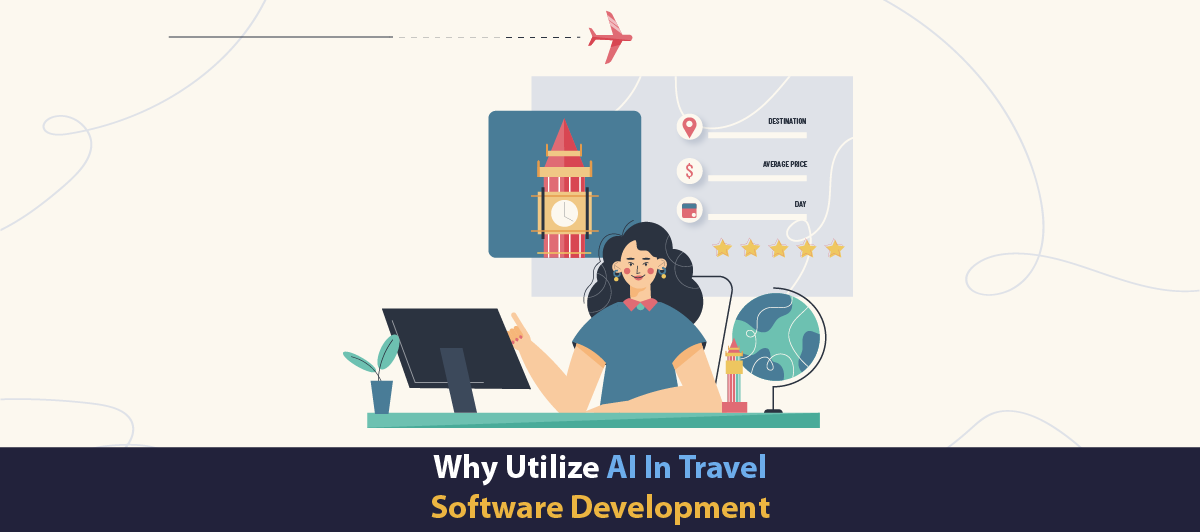How Utilizing AI Can Boost Travel Software Development
Quick Summary: In today’s digital age almost all travel companies are using AI in Travel industry Software Development. Understand the power of artificial intelligence to transform the travel industry. Let’s have a look at the benefits of integration of AI in the tourism industry!
Introduction
The ability of artificial intelligence (AI) to play a role in the ever-evolving transportation software. It has the potential to take solutions to new heights. A world where travel planning is seamless, personalized, and predictive. In today’s age, AI algorithms work tirelessly behind the scenes to enhance and deliver user experiences. There are various benefits of implementing AI in the travel industry.
But what? Let’s have a look;
AI is revolutionizing transportation software by providing intelligent data analysis, predictive modeling and personalized recommendations. Through machine learning, algorithms can understand user preferences, predict customer behavior. It can also suggest personalized travel plans, and even optimize travel routes to make them more efficient and cost-effective.
One of the major contributions of AI is the automation of customer service. Powered by natural language processing (NLP), chatbots can communicate with passengers. Hence, they can provide instant assistance, and handle routine checks, freeing up human agents for more complex tasks. Additionally, AI enhances safety and security measures by analyzing systems to identify potential anomalies or hazards. It results in a smoother and safer travel experience.
Integrating AI into travel software development isn’t just a trend; It is a transformative force in the business world that drives innovation, efficiency and customer satisfaction. Read this full article and know each benefit in detail. Also, Leverage the expertise of travel software development companies.
Overview To Travel Software Development
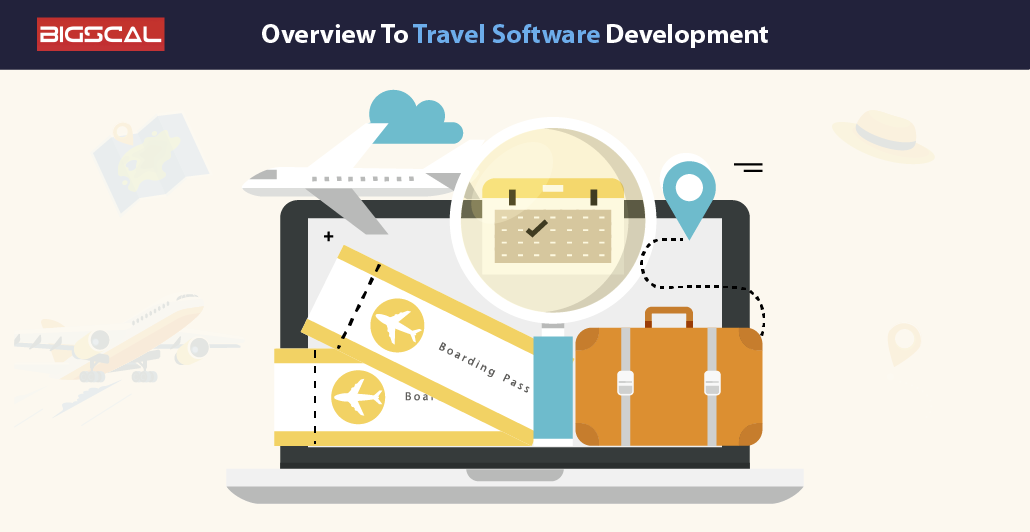
Travel software and travel business development involves building applications, platforms and solutions that meet the needs of the travel industry. It encompasses a wide range of services from booking reservations to travel plan management, payment processing and customer service tools.
A key element of travel software development is the integration of APIs to access data from airlines, hotels, rental car companies, and other service providers. For users the role enjoys a seamless navigation experience, enabling comparison of prices. It checks availability and makes real-time reservations.
Another important aspect is the implementation of strong security measures to protect sensitive customer information. These are payment details and personal information. This includes compliance with industry standards such as encryption protocols, secure payment gateways and PCI DSS (Payment Card Industry Data Security Standard).
In addition, travel software often provides features such as itineraries, customized itineraries, travel alerts, and real-time flight, hotel room accommodation and activity updates. Mobile customization is also important. It ensures that users can access and manage their travel plans conveniently from their smartphone or tablet.
Types Of Travel Software Development
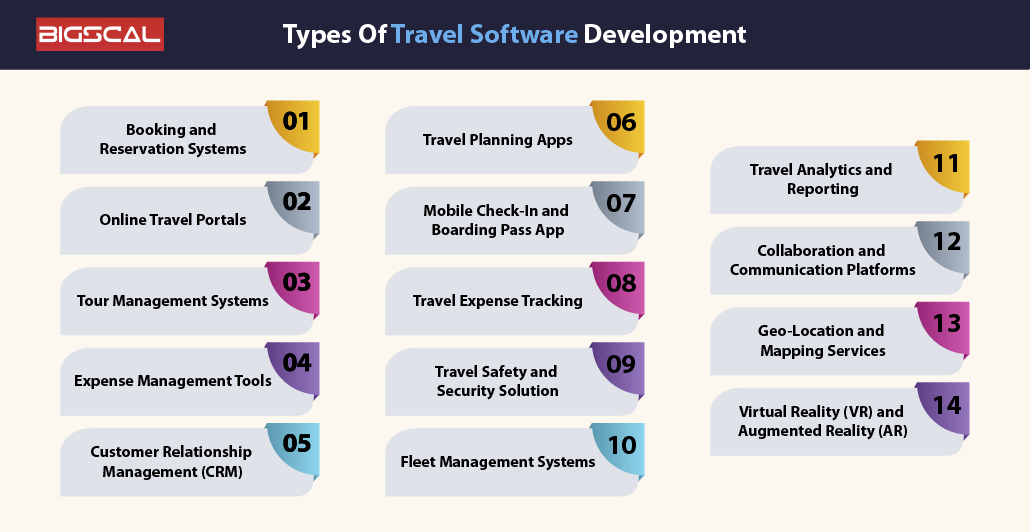
- Booking and Reservation Systems
- Online Travel Portals
- Tour Management Systems
- Expense Management Tools
- Customer Relationship Management (CRM)
- Travel Planning Apps
- Mobile Check-In and Boarding Pass App
- Travel Expense Tracking
- Travel Safety and Security Solution
- Fleet Management Systems
- Travel Analytics and Reporting
- Collaboration and Communication Platforms
- Geo-Location and Mapping Services
- Virtual Reality (VR) and Augmented Reality (AR)
Overview To Artificial Intelligence In Travel
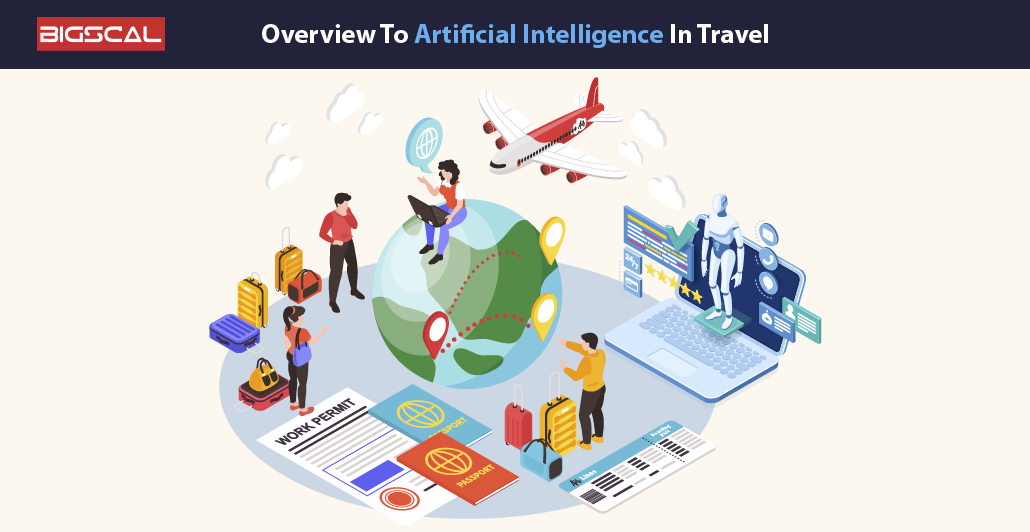
AI, an AI component, has been revolutionizing the travel industry by being engaged in the whole of the passenger journey. This enables AI to be an AI component helping in the whole passenger journey. AI empowering people, ranging from personalized suggestions to fast and efficient customer service, is of paramount importance. Chatbots are one of the most significant applications in which the AI is utilized to give instantaneous answers, to make the booking process conveniently executed and recommendations provided on the basis of the user preferences. AI understands all this data to provide perfect pricing strategies, demand level predictions, and profitableness for the airlines, hotels, and other travel agencies.
In this context, AI helps emotions analytics through customers operational process with their journeys’ experience, level of satisfactions and sentiments. It helps organizations to handle data faster than manual methods can and improves service provision. First of all, voice-activated virtual devices are like devices which updates, mobile apps that are voice activation or manually activated, provide real-time travel assistance, facial recognition, and travel recommendations. Another aspect of AI’s impact on the travel domain includes not just the improvement of services but also their personalization, and all of this while creating the smoothest possible experience for the travelers globally.
Benefits Of Utilizing AI Can Boost Travel Software Development
Here are some of the benefits of implementing AI in Travel Industry Software Development:
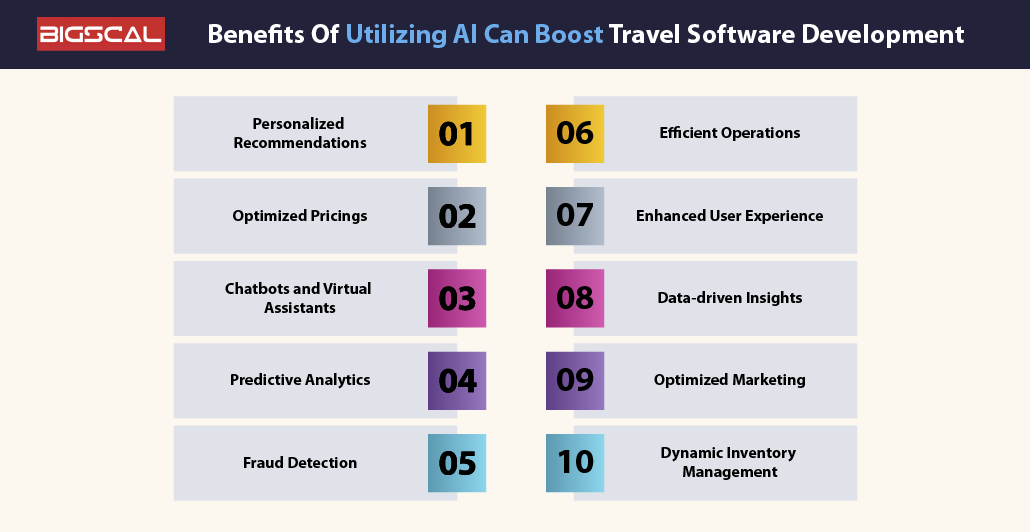
Personalized Recommendations
In travel software development, AI enables personalized recommendations tailored to individual preferences. By analyzing a wealth of information including past travel patterns, search history and user behavior, AI algorithms can make more accurate and relevant recommendations e.g., AI can recommend destinations, accommodation, activities , even travel plans based on personalized advice and on factors such as budget, route, interests and past experience.
This personalization not only enhances the user experience but also increases customer satisfaction and loyalty. Travelers feel more understood and valued when they receive recommendations tailored to their specific interests and needs. Furthermore, personalized recommendations can increase conversion rates because users are more likely to subscribe to services that align with their interests and expectations.
Optimized Pricings
AI plays an important role in optimizing pricing strategies in travel software. Using machine learning algorithms, businesses can analyze market data, competitor prices, demand patterns, and consumer behavior to dynamically adjust prices in real time This dynamic pricing strategy ensures prices are competitive and generates significant revenue and profitability.
Additionally, AI can help identify aspects of pricing and tailor pricing strategies accordingly, such as discounts or promotions for specific customer segments. This fluctuation in prices not only attracts more customers but also optimizes revenues by capturing prices from various markets. Overall, fixed pricing through AI improves economies of scale and provides a competitive foundation in the transportation industry.
Chatbots and Virtual Assistants
The addition of AI capabilities of AI-powered chatbots and virtual assistants to travel software development has many advantages. First, these tools enhance customer service by providing immediate answers to questions. Therefore, it improves the overall user experience. Travelers can access real-time assistance throughout bookings, itineraries and itineraries without delay, resulting in greater customer satisfaction.
Additionally, AI-powered chatbots are capable of handling multiple queries simultaneously, reducing the workload of human agents. It allows them to focus on complex issues. Not only does this streamline operations but it also revenue management and also reduces travel companies’ labor costs.
Moreover, chatbots and virtual assistants can automate interactions based on user data, preferences, and past actions. This personalized approach fosters stronger customer relationships and facilitates repeat business and positive reviews.
Predictive Analytics
Combining predictive analytics with travel software allows companies to make data-driven decisions and better anticipate customer needs. By analyzing historical data, trends and trends, predictive analytics can forecast demand, price fluctuations, and popular destinations.
This capability enables travel agents to optimize pricing strategies, optimize product distribution, improve customer service and tailor promotions to specific customer segments Through predictive analytics, companies can create targeted marketing campaigns that their audience meets, increasing conversion rates and revenue.
Additionally, predictive analytics can enhance risk management by foreseeing potential problems such as flight delays, weather problems, or accommodation issues This proactive approach to flight forecasting enables companies to mitigate risk, reduce customer dissatisfaction, and maintain a competitive edge in the transportation industry.
Fraud Detection
The use of AI in the travel industry software of predictive maintenance of travel software can dramatically increase the ability to detect fraud. AI-powered algorithms can analyze large amounts of data in real-time, identifying suspicious patterns and behaviors that could indicate fraudulent activities These algorithms can look for anomalies in transactions, flag them for further analysis or automatically block them for deterrence financial loss.
One of the major advantages of AI in fraud detection is its ability to constantly learn and adapt. Machine learning algorithms can improve over time by identifying new schemes and developing fraud techniques, making them more effective in preventing various forms of fraud. By integrating AI into fraud-detection travel software, businesses can protect themselves and their customers from the financial loss and reputational damage caused by fraudulent activities.
Efficient Operations
A.I. One area where AI excels is in automating repetitive tasks that would otherwise typically require human intelligence or significant human intervention. For example, AI-powered chatbots can provide customers with questions, booking options, and even personalized recommendations based on user preferences. This automation not only reduces the workload on human agents, but also improves response time and customer satisfaction.
Additionally, AI algorithms can help companies make data-driven decisions by analyzing data on travel demand, pricing, and customer behavior. This includes optimizing pricing policies, identifying market opportunities and anticipating changes in demand, all of which contribute to both operational efficiency, and financial outcomes.
Overall, the integration of AI into transportation software development is enabling companies to operate more efficiently, deliver better customer experiences and compete in a rapidly growing industry.
Enhanced User Experience
The use of AI or generative AI in travel software development dramatically enhances the user experience through customized services and recommendations. Through AI algorithms, travel systems can analyze users’ behaviors, preferences, and past interactions to provide tailored recommendations. For example, AI can suggest personalized itineraries based on a traveler’s interests, budget and past travel history. This customization enhances a more enjoyable and satisfying experience for users, making it easier to return to the platform for future navigation needs.
Additionally, AI-powered chatbots and virtual assistants provide immediate and efficient online customer service and support. It addresses the queries, providing real-time updates and assisting in the booking process. These intelligent systems mimic human interaction. It also provides a seamless and user-friendly experience around the clock. By streamlining the user experience and providing personalized recommendations, AI is making a significant contribution to increasing the overall satisfaction of passengers using these software solutions.
Data-driven Insights
The integration of AI into navigation software and booking processes opens up the potential to harness large amounts of data to gain valuable insights. These insights can be used to understand market trends, customer preferences, and operational efficiencies. AI algorithms can analyze data from various sources, including customer reviews, social media and booking patterns. It identifies upcoming travel trends and forecasted demand.
Additionally, AI-powered analytics tools can provide real-time data insights, enabling travel companies to make data-driven decisions faster. This includes optimizing pricing policies, identifying new business opportunities, and improving business processes. By leveraging AI for data analytics, travel software providers can empower their clients with actionable insights. It helps them remain competitive in a dynamic and evolving industry environment.
Optimized Marketing
The use of AI in travel industry software development offers many benefits, one of which is customized marketing strategies. AI-powered tools can analyze vast amounts of data including user preferences. Historical booking patterns and market trends to develop personalized marketing campaigns around. Customer behavior and preferences logic allows travel companies to tailor their promotional efforts to better target specific demographics.
AI can also automate tasks such as email marketing, social media advertising, and product development. It frees up HR to focus on more strategic aspects of marketing. Furthermore, research AI controls provide real-time insights into campaign performance. It enables businesses to make data-driven decisions and optimize their marketing strategies for better results.
Dynamic Inventory Management
Another important advantage of using AI in travel industry software development is dynamic inventory management. Traditional inventory management systems often struggle to adapt to rapidly changing market conditions and customer demands. In other words, AI algorithms can analyze historical customer data first, market data, and real-time customer behavior. It is to optimize inventory levels and pricing in real time.
A.I. Dynamic pricing algorithms can also change pricing dynamically based on factors such as demand, seasonality, and competitor pricing. To maximize revenue and profitability. Furthermore, AI-driven inventory management can improve efficiency by automatically replenishing inventory. With more accurate prediction of demand and reduced error which is done by hand.
Develop AI Driven Travel Software With Bigscal Technologies
Software with AI skills. Imagine this: an easy customized itinerary, AI suggestions for hidden gems in your destination, and real-time updates with customized travel alerts for you alone in it. We will provide you travel app development services with the expertise in integration of AI.
Our new approach harnesses the power of AI to change the way you travel. From intelligent packaging recommendations based on weather forecasts to intelligent suggestions for local experiences. Our software will be your ultimate travel companion.
With Bigscal Technologies, your travel experience goes beyond the ordinary, and makes every trip a thrilling adventure filled with discoveries. Join us in redefining transportation technology, where every click opens doors to innovation, guided by AI intelligence.
Conclusion
Integrating AI in the travel industry software development is like a technological miracle. It transforms the user experience, streamlines operations and improves decision-making processes. From personalized recommendations based on personal preferences to predictive analytics that optimize distribution. AI is transforming the transportation industry into a realm of efficiency and innovation. AI adoption is not an option they will simply adopt but it is a necessary strategy for companies looking to succeed in a competitive environment.
FAQ
What are AI technologies?
AI technologies, including machine learning, natural language processing, computer vision and robotics. It enables systems to automate, understand, learn and execute tasks, transforming industries as diverse as healthcare, finance and transportation.
Can AI do baggage handling?
Yes, AI can help control processes through systems such as automated sorting, tracking and optimizing logistics at airports and other travel destinations. It improves efficiency and reduces errors.
How AI is used in transportation?
AI is being used in transportation to create better roads. It also creates autonomous vehicles, traffic management, predictive maintenance and smart logistics, safety, efficiency. With all that it increases productivity in various modes of transport such as cars, trains and drones.
Explain what is artificial intelligence in travel and tourism?
Artificial intelligence in travel and tourism refers to the use of AI technologies. This can be chatbots, recommendation systems and data analytics. It enhance customer experience, personalize services, improve efficiency and improve decision-making in the travel industry.
Is there an AI for trip planning?
Yes, there are AI-powered travel planning tools that analyze preferences, recommend destinations, recommend activities, book accommodations. And create personalized itineraries. This all makes travel planning easier for the users.
